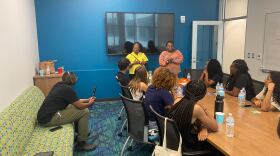https://www.youtube.com/watch?v=m2koucJGM_o
Taylor Walker, 16, is a senior at Northern High School in Durham.
The black community is having a pretty hard time trusting law enforcement—especially the youth. A lot of us think, "Cops are out to get me."
But Steve Chalmers, the former Chief of Police for Durham, said otherwise.
"That's not true," Chalmers said. "We are not out to get them. We are out to do a job, and that's to enforce the law and make sure the community is safe."
Chalmers said African Americans in law enforcement often find themselves on both sides of the conflict. Captain Raheem Aleem of the Durham Sheriff Department said it's personal for black cops.
"If it wasn't for that uniform, him or his children could be out there in the community, and how do you ensure that that officer who stops them is stopping them for something that they did wrong, not for the color of their skin?" Aleem said.
"This is a profession, and we stepped in it because we wanted to safeguard the community even against those officers who are doing things wrong."
Chalmers said that's the way it was back when the Hayti police, Durham's first black officers, were around. In the '40s, '50s and '60s, they policed the neighborhoods they lived in. They had a better understanding of the community needs and how to deal with those issues.
"As a child, I had the opportunity to actually experience being in a community where we had black police officers," Chalmers said. "They were like heroes in our community."
But many youth today feel differently. When I talk to my friends, their experiences with law enforcement have mostly been negative.
"When I was little, I did not like police," Aleem said. "I used to go and cut this man's grass and never knew what the man did for a living, and you know I thought he was my friend."
That man turned out to be an undercover cop and showed up at Aleem's house one day.
"I said, 'What's going on? I'll see you on Saturday,' and he was like, 'You know, no, I need to see your brother,'" Aleem said. "I see these other cops come up, and I'm looking at him like what's going on and he arrested my brother. I didn't know (my brother) was selling drugs. He was selling marijuana."
At first, Aleem was frustrated and upset. But the cop continued to check up on Aleem.
"That man started coming over to my house talking to me more, giving me some insight," Aleem said. "I realized I could see it for myself that the drugs my brother was selling was hurting the community and not helping it. This man was trying to help the community even though the community did not appreciate that."
That cop inspired Aleem to pursue a career in law enforcement. Today, as a black officer, Aleem teaches his deputies to build relationships and trust with Durham citizens.
"I tell them go out in the community, the community centers, the neighborhood where kids are hanging out," Aleem said. "Go out and play basketball with them. Go play on the playground with them."
Aleem believes officers need to get out of the patrol car and talk to people. He said this is especially true for his officers of color who serve as leaders in fixing this relationship with citizens.
"The best weapon that all officers have on the street is not a taser," Aleem said. "It's not a hand gun. It's that thing south of your nose and north of your chin—the mouth."
Both Aleem and Chalmers said the more people talk to cops when they're not in crisis, the better chance they'll have of building a positive relationship.
"There are cops that are not good, and there are cops who will give their life to save someone," Aleem said. "Until cops actually admit that there are cops who are wrong and the community backs up and says, "You know what, there are cops who are good!" Until we have that open dialogue, nothing is ever going to change."
Chalmers said it's not a good time to be in law enforcement right now.
"There are officers working to make a difference, and they are out here trying to make a difference," Chalmers said. "They are working hard to change that perception in the community."
Chalmers and Aleem said everybody has a role to play in healing the relationship between law enforcement and the communities they serve. They also said being a black cop comes with its own set of frustrations and challenges but also a sense of honor and responsibility.
"I am an officer," Aleem said. "I am a black officer, and I'm out here doing the best I can every single day. It is frustrating, but I got into this job to make a difference."











